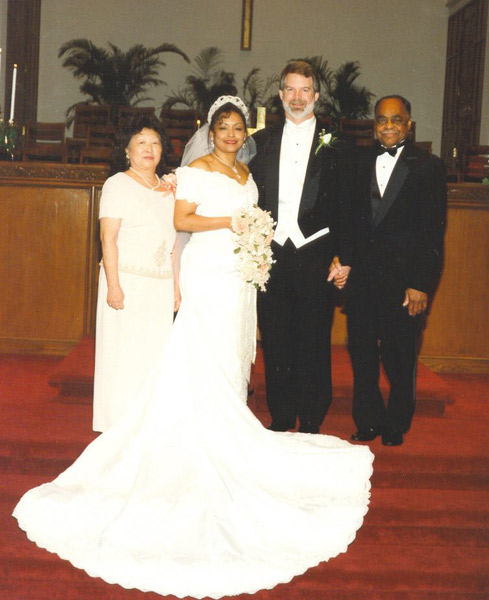 |
|
Adams (right) and his wife (left) celebrated the marriage of their daughter Della Adams on Aug 16, 1998, just 13 months before he died.[Photo provided by Della Adams to China Daily] |
Looking back, Della Adams lamented that the "cultural revolution" was far from the only reason for her father to return to the US.
"One compelling reason", according to her, was her grandmother, who gave birth to Clarence Adams at 18 as an unmarried woman. "Partly because of that, she rejected him all her life, forbidding him to call her mom and later treated our family horribly," said Della Adams, who believed that her father had turned down a teaching post with the University of Hawaii in order to reunite with his family in Memphis.
"He was deeply hurt but never hated her. Instead, he loved her fervently."
This is, it could be said, more or less the relationship between the man and the land of his birth. Having read about the progress of the US civil rights movement thanks to his job at Foreign Languages Press in Beijing, Adams believed that the possibility had arisen for his family to have "a life" in the South, something he yearned for as a train-hopping high school dropout.
During those long conversations he had with his daughter in his final years, Clarence Adams would fault himself for having brought his wife to the US.
"I thought I could give her a better life, only to make her work like a dog," he said, tears in his eyes.
"Racism was and still is the absolute biggest issue in Memphis. This is where Martin Luther King was assassinated, two years after we came back," Della Adams said. "If you look at America, not just Memphis, what is happening? It looked like it had improved, but it really, really didn't."
But her father stayed on and carved a path for himself, after gaining degrees from two top Chinese universities. These days, every now and then, the daughter still gets people telling her how much they miss the food in Chop Suey.
One emotionally loaded moment depicted in the book was when Clarence Adams and his fellow 20 POWs "stood in silence and watched" as the other US soldiers boarded a ship docked on the Yalu River and headed home on Aug 23, 1953.
"Only then did it really hit me that I had reached the point of no return," he said. "I hate to go to China for the right to create a good life. I should have been able to do this in my own country."